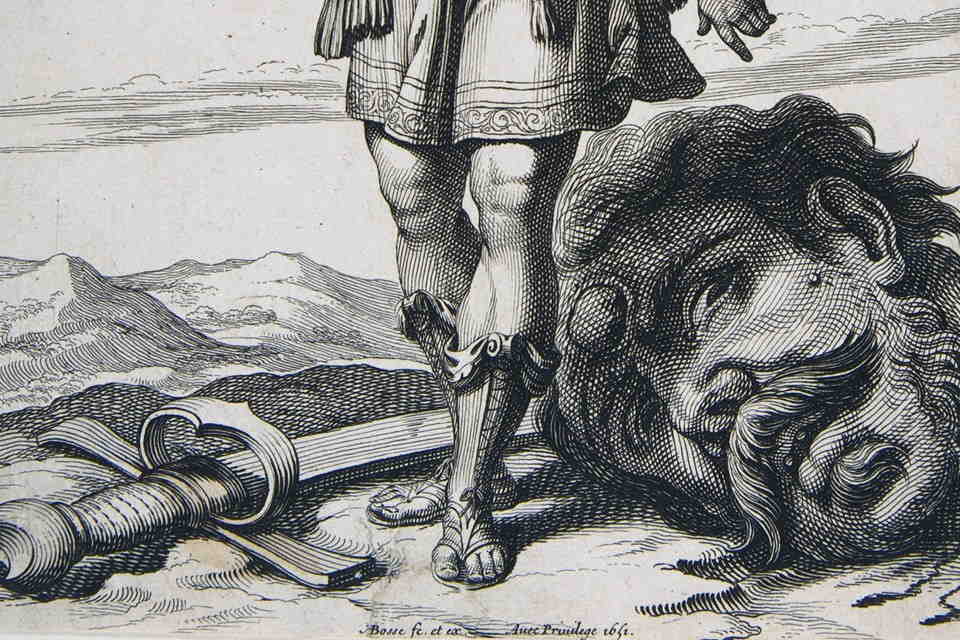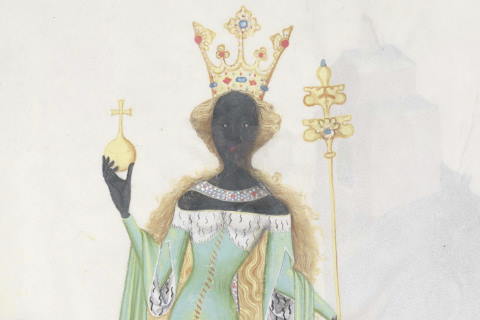Goliath, Job and Other Monsters of the Hebrew Bible

A scene from the David and Goliath story by the French printmaker Abraham Bosse from 1651.
Jan. 4, 2022
By S.I. Rosenbaum
People read the Hebrew Bible for all sorts of things — spiritual guidance, literary inspiration, moral enlightenment.
Assistant professor of Hebrew Bible Madadh Richey looks for monsters.
She finds them everywhere — in the Book of Numbers, where God sends snakes to punish the Israelites; to the mysterious nephilim, sons of God, in Genesis who cohabitate with human women; to the more well-known ones such as the Leviathan, the giant fish in Jonah, and the demoness Lilith.
Richey said monsters have traditionally gotten short shrift from Biblical scholars, who have dismissed them as incidental or irrelevant or explained them away as antiquated descriptions of real animals such as crocodiles and bison.
But ancient peoples attached huge significance to monsters, Richey said.
"They were trying to think about them and think with them," she said.
Her research focuses on how the writers of the Hebrew Bible interpreted and reinterpreted supernatural creatures found in other cultures throughout the region. In Babylon, Assyria, Persia, Egypt, Canaan and elsewhere, monsters expressed differing views of the cosmos and the divine order.
Richey employs a school of literary criticism known as "monster theory," applying techniques other scholars have used to analyze horror movies and Gothic novels.
Examining the Bible’s monsters offers a new way of exploring the culture of ancient Israel and the texts it produced as well as approaching the idea of God, Richey said.
"The history of biblical scholarship has trained us not to think about monsters," she said. "There's a tendency to lose track of the threatening, violent and chaotic aspects of the divine."
T.J.E. asked her about two monsters she studies, the giant Goliath and, surprisingly, Job.
Goliath's Dead Head
The gigantic champion of the Philistines slain by the biblical King David isn't just a big guy — the Bible specifies that he's more than nine and a half feet tall, putting him solidly in monster territory.
In a paper earlier this year in the Journal for the Study of the Old Testament, Richey focused on the way David decapitates Goliath and then brings his head to Jerusalem. She drew a parallel with the second-millennium B.C.E. Sumerian "Epic of Gilgamesh," where the hero cuts off the head of the fire-breathing giant Ḫumbaba, like King David, to use it as a totem of his power.
It's by acquiring their foe's head, Richey wrote in her article, that David and Gilgamesh appropriate the enemy monsters' powers.
Though David is depicted elsewhere in the Bible as flawed and intensely human, the battle scene with Goliath is meant to endow him with extra-human powers.
An abiding riddle of the David and Goliath story has been how David can go to Jerusalem when he does not yet have control of the city. But Richey said the ancient Hebrews would not have thought about such practicalities. David had slain a monster and possessed his head. His actions and behavior didn't conform to human logic.
Job's Rotting Flesh
The Book of Job is full of references to mysterious, powerful monsters — the sea serpent Leviathan, for example, and the gigantic land animal Behemoth.
But Richey sees something monstrous in Job himself.
Job is a wealthy, righteous and upstanding man living in a land called Uz who endures a series of horrific misfortunes designed to test whether he'll turn against God. As Job's suffering persists, his body decomposes. "My flesh is clothed with worms and clods of dust; my skin is broken and become loathsome," Job says about himself.
Decomposition and deformity are common monster features. Think of the rotting flesh of zombies or the way Jeff Goldblum's body transmogrifies in the movie "The Fly."
Richey said it's possible to think of Job as another of God's monstrous creatures, underscoring that not everything God creates or does will be pretty, happy or understandable to humans.
The monstrous elements of Job's body reinforce God's message to Job at the end of the narrative, where God says He is so much greater than Job can comprehend and that Job should not seek to understand what God does.
Richey said monsters also serve as symbols of the immensity of God's power. "The monster language in the Hebrew Bible reveals Yahweh as a deity who productively engages in forces of chaos and monstrous threat," she said. "He doesn't just conquer or subdue or eliminate the monstrous, but actually uses it toward his own ends."



